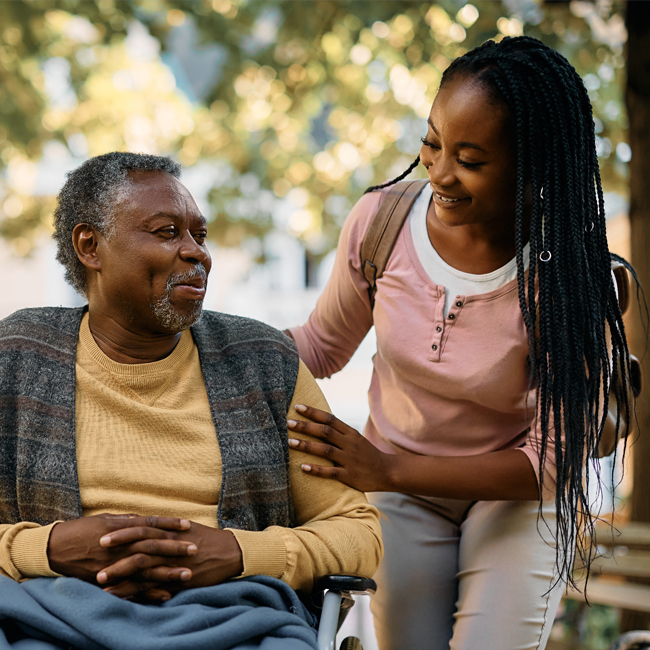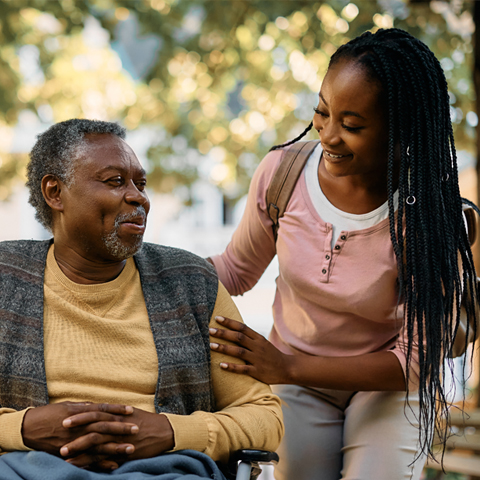What are Varicose Veins?
Varicose veins are dark, bulging, twisted veins that you can see below the surface of the skin. They usually appear on the back of the calf, on the inside of the leg, or in the groin. Varicose veins develop when the specialized, one-way valves that keep blood moving upward through the legs toward the heart deteriorate. In normal veins a series of these valves work together, opening to allow blood to flow upward, then closing to keep the blood from flowing back toward the feet. As the valves deteriorate, blood leaks or flows backward and pressure in the vein increases, stretching and dilating the vessel. The backflow of blood can also result in the formation of a blood clot, a potentially serious condition called deep vein thrombosis.
Patients with varicose veins may seek to improve their cosmetic appearance or relieve their symptoms. At NewYork-Presbyterian, vascular specialists at our two dedicated vein programs offer the advanced and comprehensive treatment for patients with varicose veins. With the latest technologies and the vast resources available at our two renowned medical centers, our experts are here to provide the best possible care to alleviate symptoms and improve quality of life.
Signs & Symptoms
Symptoms of varicose veins include:
- Fullness, heaviness, aching, and pain
- Visible, swollen veins
- Smaller veins that you can see on the surface of the skin (called spider veins)
- Thigh or calf cramps, often at night
- Mild swelling of feet or ankles
- Itching
- Restless leg symptoms
If blood flow through the veins becomes worse, symptoms may include bleeding, changes in skin color, or a skin breakdown called venous ulcers.
Risk Factors
Risk factors for varicose veins include:
- Older age
- Being female (hormonal changes from puberty, pregnancy, and menopause can lead to varicose veins, and taking birth control pills or hormone replacement can increase your risk)
- Being born with defective valves
- Obesity
- Pregnancy
- History of blood clots in your legs
- Standing or sitting for long periods of time
- Family history of varicose veins
Diagnosis & Treatment
Doctors may use a venous ultrasound test to determine the cause or severity of the condition and to determine if the enlarged veins contain blood clots. Vein treatments are designed to treat visible varicose veins as well as abnormal veins that may not be visible, but may be the underlying source of the visible veins and symptoms. If varicose veins are the only problem, treatment usually involves collapsing or removing the visible varicose veins through one of the minimally invasive methods we offer.
Conservative therapy
Varicose veins can sometimes be managed with conservative approaches including:
- Elevating the legs when sitting
- Exercise, which increases circulation
- Compression stockings, which apply a steady pressure to the legs to help the veins and leg muscles move blood toward the heart
- Avoiding long periods of standing
Minimally invasive approaches
At NewYork-Presbyterian, our vascular specialists use a wide range of minimally invasive approaches to treat varicose veins of all sizes, including small, medium, and large veins. These include:
Sclerotherapy - An in-office procedure to eliminate spider veins and small to medium size varicose veins. Doctors inject concentrated saline or other solution into the varicose vein, which irritates the lining of the vein and causes it to close up or collapse. New techniques (foam) and new solutions (recently FDA-approved) enable us to treat more medium-sized veins through sclerotherapy.
Endovenous laser ablation treatment (EVLT) - Uses laser energy to cauterize (burn) and close the abnormal veins that lead to varicose veins.
Phlebectomy – A minor surgical procedure to remove varicose veins that lie just beneath the surface of the leg. One approach uses a thin lighted wand inserted under the skin to illuminate the veins, while a second minimally invasive instrument is used to remove the problem vein. At NewYork-Presbyterian/Columbia, our vascular team has contributed to the development of this approach and currently educates other physicians on the technique.
Tissue adhesive closure- Anew FDA-approved technique that uses a medical adhesive to treat varicose veins by sealing closed the abnormal great saphenous vein (GSV). The Weill Cornell Vein Treatment Center was the first in Manhattan to perform this new technique for lower extremity veins.
Mechanicochemical ablation -A new FDA-approved technique that uses a special delivery catheter to deliver an irritant drug (sclerosant) to the vein intended to be closed while a wire is used to irritate the inside of the vein to produce a better response to the sclerosant.
Polidocanol injectable foam - Treats varicose veins caused by problems with the great saphenous vein (GSV) and its related veins. It is delivered through the placement of small ultrasound-guided IVs and injected for targeting the abnormal veins.
Traditional surgery
Vascular specialists may recommend surgical treatment for patients whose varicose veins cause severe aching, infections, or venous ulcers, or whose varicose veins are particularly large or severe or involve large veins in the groin.
Prevention
You can lower your risk of varicose veins and other vein problems by making lifestyle changes, including:
- Quitting or avoiding smoking
- Avoiding restrictive clothing like tight girdles or belts
- Avoid standing or sitting for too long
- Eating a heart-healthy diet
- Exercising regularly
- Maintaining a healthy weight
Why Choose Us
Expertise in vascular care
NewYork-Presbyterian is a leader in the field of vascular care, with a long tradition of expertise, innovation, and leadership. Our vascular specialists are board certified in vascular or endovascular medicine, cardiovascular disease, and interventional radiology. They have expertise in diagnosing and treating abnormalities of the vascular/circulation system, including varicose veins, offering the highest level of specialized care and advanced therapies. Our vascular specialists are internationally known for the treatment of these conditions using minimally invasive therapies.
Dedicated vein programs
Our vein specialists are experts in the full range of treatments, including the most serious forms of vein disease such as chronic venous insufficiency and ulcers. NewYork-Presbyterian has two dedicated vein programs:
- The Weill Cornell Medicine Comprehensive Vein Program is dedicated to the diagnosis and treatment of varicose, spider veins, and other venous disorders, providing personalized and specialized care within a state-of-the-art academic medical center.
- At NewYork-Presbyterian/Columbia University Irving Medical Center, the Columbia Vein Program offers expertise to treat a full range of vein disorders and diseases, from cosmetic concerns to the most serious health emergencies.
At our vein centers, teams of vascular specialists provide a comprehensive workup not only to diagnose varicose veins but also to determine if there are other underlying vascular pathologies. We look at the entire venous system, the deep venous system, the superficial venous system, the varicose veins, and what's on the skin. Our expert physicians offer a wide range of therapies, many of which can be performed right in the doctor's office.
Free vein screening
NewYork-Presbyterian/Columbia's vascular program offers free 15-minute virtual vein screenings with a doctor. A vein screening is an educational and informative consultation about veins and conditions that affect the veins. During the consultation, a vein specialist will look at your legs and identify any spider veins, varicose veins, and other vein issues/concerns you have. If necessary, the physician will decide if you need to schedule an in-person appointment and will discuss the best treatment plan for you. For more information. please email Annmarie Tarleton at [email protected]
Individualized and holistic care
At NewYork-Presbyterian, our vascular specialists offer individualized and holistic care, tailoring your treatment to your medical history, lifestyle, and wellness goals. Our goal is to understand your condition and then treat it in a way that improves your lifestyle and prevents future vascular problems. We work closely with our patients and referring physicians to coordinate a personalized treatment plan for every patient. We are especially skilled in diagnostic imaging, vascular medicine, and minimally invasive procedures that allow for shorter and less painful recovery times.
Multidisciplinary team approach
Vascular conditions can affect many areas of the body and may require input from other specialists. Our physicians collaborate with other world-renowned experts at NewYork-Presbyterian, ensuring that you receive the care you need. Your healthcare team may include vascular and endovascular specialists, surgeons, cardiologists, and other specialists.
Propelling the field through research
At NewYork-Presbyterian, our vascular specialists have experience with even the most complex vascular conditions. Our patient volume allows us to conduct clinical trials of all the newest vein therapies. In fact, the most advanced therapies are often available at our program before other centers in the country, and at times, the world. We continue to drive research into innovative and groundbreaking potential treatments.
Locations
Columbia University Irving Medical Center
Herbert Irving Pavilion




